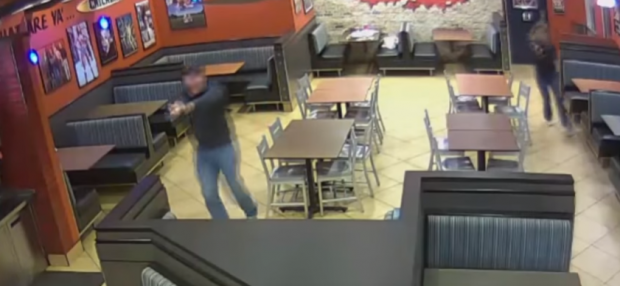Written by: Greg Ellifritz
Last week, some friends and I had a discussion on my Facebook page about a recent incident where two off-duty police officers (husband and wife) interrupted a robbery in progress at a local restaurant. The incident was captured on surveillance video.
The two cops spread out, flanked the bad guy at gunpoint and gave verbal commands. The bad guy fled. They gave chase and caught him outside.
If you aren’t familiar with the incident check out the video below.
Married cops out on “date night” stop a robbery
The discussion on my page was about whether I thought what the two officers did was a good thing and what would be the optimal response for a CCW carrier or off duty cop in a similar scenario.
When trying to determine the “best” response, we first have to look at all of our available options. The way I see it, the cops had four possible response options:
1) Stay at table. Do not intervene. Covertly attempt to get a good physical description of the bad guy and call police as soon as possible.
2) Attempt to escape the situation.
3) Intervene by drawing guns and giving verbal commands
4) Intervene by shooting the robber without warning.
The officers chose option number three. That led to a successful resolution. I admire the officers for their courage and dedication to duty. I’m glad they got the robber locked up. With that said, I think I would handle the situation a bit differently.
Please note that I’m not saying the officers’ response was wrong. Please note that I am not advocating my course of action for anyone else. There are lots of dynamic variables one must consider in an event like this. I’ll discuss the potential benefits and pitfalls of each possible strategy and allow you to make your own choice about what you might do in a similar situation.
I will caution you to consider something that few people actually think about in situations like this…
The outcome of this incident was good. Too often our tactics are evaluated solely by that metric. That’s not the proper way to look at things. We should be judging the process rather than the outcome. If our process for dealing with such an event is optimal, the outcomes will almost always be favorable. The reverse is not always true.
What if the officers confronted the robber and he killed the clerk before the cops could shoot him?
What if a crazy gunfight happened and six innocent people in the restaurant got shot?
What if the robber’s accomplice waiting outside shot the officers from behind when their attention was focused on the robber?
Would you think the officers’ tactics were optimal if any of those events took place? That’s the problem. We can control the process. We can’t control the outcome. Things could have gone very differently. If a bunch of innocent people got shot, I guarantee that these heroic cops would be castigated and their attempts to apprehend the robber would be characterized as reckless and irresponsible.
Think about the process. The outcome is out of your control.
“Good luck reinforces bad tactics.”
What is the optimal process to best ensure no one gets hurt and the bad guy gets caught?
I’ve thought about it quite a bit. My response would look quite a bit different than what this couple did. I would essentially choose option two (escape) from my list of possible responses above. Here is my detailed response:
– I would remain seated and covertly draw.
– I would have my wife exit as quickly as possible and get on the phone to police. I would cover her exit and shoot bad guy if he made any move to stop her. Her job is also to stop anyone else (including the bad guy’s potential accomplices) to go inside the restaurant.
– Once wife is safely out, I would attempt to exit. I would shoot bad guy if he attempted to stop me.
– Once outside, I would holster, but keep my hand on my gun.
– I would attempt to identify the getaway car. I would watch from a position of cover and provide vehicle info, suspect description, and direction of travel to local police.
– Then wife and I would go back inside and finish our meal.
– I wouldn’t make any effort to apprehend the criminal. I would only shoot if he was impeding our exit or he began shooting employees.
Why would I choose this option instead of the other three possible options? Let’s take a look at each of the options and talk about why they may be less than optimal here.
Option One: Stay seated. Be a good witness. This is actually a very attractive option. I would have no problem if someone chose to do this. One could argue that staying put and pretending not to notice the robbery is safer than leaving.
It would be safer if we could guarantee that the bad guy was alone and just wanted the store’s money. I’ve seen quite a few of these robberies where the bad guy gets the money in the register and then starts herding people into the back room to either kill them or rob them as well.
Sitting still doesn’t seem as attractive if the bad guy has those plans.
I’m also worried about a potential accomplice. About 40% of armed robberies are perpetrated by multiple assailants. Think about what would happen if a second bad guy was in the room or came in from the outside. If that happened, the bad guys could use the exact tactic that the cops used to their advantage instead.
Notice how the cops spread out, thereby dividing the bad guy’s attention and making it difficult to shoot both at the same time. If the robber had an accomplice, the two of them would be able to fix the cops into a static position and concentrate fire onto the cop’s table from different directions. That wouldn’t turn out very well.
I’m also worried about being in a seated position, less able to effectively return fire, and having limited mobility if things kick off. I’d rather be standing and moving than seated if the shooting started.
Finally, getting outside allows me to better prevent innocent people from coming into the restaurant during the robbery. I can’t do that if I stay at the table.
As I said, one could make a case for staying put and pretending not to see anything, but I don’t think it’s the optimal response for me.
Option three: Draw guns and issue verbal commands. That’s what the cops here chose. I’m not a huge fan of that course of action.
There are four possible outcomes.
1- Bad guy surrenders
2. Bad guy flees.
3. Bad guy fights you either physically or with gunfire
4.- Bad guy shoots innocent(s)
Two of those four reactions are bad. Potentially fatally bad. Willingly choosing a tactic with only a 50% chance of success doesn’t seem like the best option to me.
Not engaging or escaping gives you an almost 100% chance of avoiding a negative outcome. The cops would have eventually caught this guy without these officers’ intervention. We solve the vast majority of our robbery cases with fingerprints, DNA, and video evidence.
These cops sped up the capture, but did so at great risk to their lives and the lives of the patrons.
As uniformed officers responding to a robbery in progress, we don’t enter the location being robbed. We don’t want the robbery to turn into a hostage situation caused by our entry. Unless people are being shot inside, we will wait outside and confront the criminal when he exits because there are likely fewer people in the line of fire.
What they did was the equivalent of two uniformed officers bursting in and forcing a confrontation while surrounded by innocent people. Not the best plan in my opinion.
Option four: Shoot. Giving verbal warnings or commands gives the suspect the time to surrender. It also gives him time to kill you or an innocent third party. Shooting him preemptively would likely reduce the chance of the bad guy injuring someone else.
Is it reasonable? Probably.
I think I could articulate that a guy in a mask pointing what appears to be a gun at the clerk places that innocent clerk in reasonable fear of serious injury or death. Again we come back to outcome. If you shoot the bad guy, don’t hit anyone else, and the bad guy doesn’t start spraying bullets, you’ll likely be a hero.
If you miss your shot or it turns out that you misread the situation and it’s a high school kid playing a prank on his friend the cashier, things will not go smoothly for you. There are some very bad possible outcomes here. And again, we don’t control all of the outcomes. We can only make a good decision on the process.
How good is your shooting? Do you have a safe backstop? Do you live in a state that has a duty to retreat component in its self defense laws? All of those are questions that you have to ask if you are considering the “shoot first” option.
Besides all the issues I just mentioned, if you shoot you will undoubtedly face potential criminal and civil liability. Shooting guarantees that you will have to deal with the cops. The cops may be professional. They may also be inept.
If you successfully navigate the police interrogation without being jailed, you will most definitely be sued civilly by both the suspect and any other patrons in the restaurant trying for an easy pay day.
Is it worth that hassle? Not to me.
If I can avoid shooting someone when I don’t absolutely have to do so, that’s the option I’m going to take.
Those are my thoughts on responding to this one. Your subjective weighing of the response options and possible outcomes will likely be different from mine. That’s OK. The important thing is that you think about this scenario and determine what the best response option is FOR YOU.
I hope you choose wisely.


